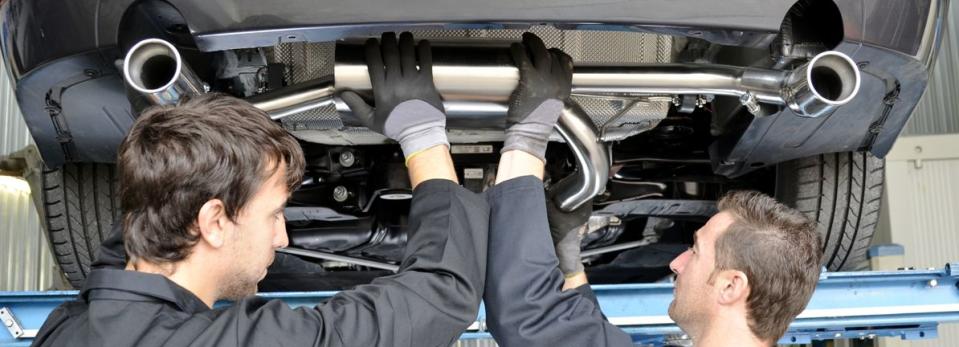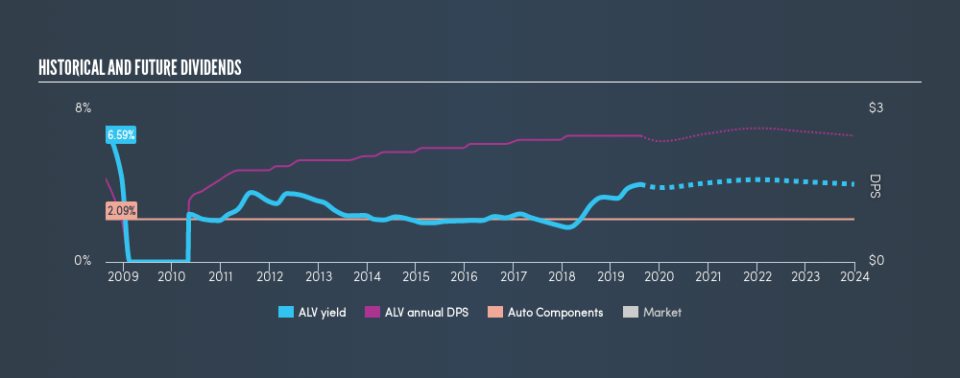It Might Be Better To Avoid Autoliv, Inc.'s (NYSE:ALV) Upcoming 1.0% Dividend

Regular readers will know that we love our dividends at Simply Wall St, which is why it's exciting to see Autoliv, Inc. (NYSE:ALV) is about to trade ex-dividend in the next 4 days. Ex-dividend means that investors that purchase the stock on or after the 20th of August will not receive this dividend, which will be paid on the 5th of September.
Autoliv's upcoming dividend is US$0.62 a share, following on from the last 12 months, when the company distributed a total of US$2.48 per share to shareholders. Calculating the last year's worth of payments shows that Autoliv has a trailing yield of 3.8% on the current share price of $65.02. Dividends are a major contributor to investment returns for long term holders, but only if the dividend continues to be paid. That's why we should always check whether the dividend payments appear sustainable, and if the company is growing.
View our latest analysis for Autoliv
Dividends are typically paid from company earnings. If a company pays more in dividends than it earned in profit, then the dividend could be unsustainable. Its dividend payout ratio is 88% of profit, which means the company is paying out a majority of its earnings. The relatively limited profit reinvestment could slow the rate of future earnings growth It could become a concern if earnings started to decline. Yet cash flows are even more important than profits for assessing a dividend, so we need to see if the company generated enough cash to pay its distribution. Over the past year it paid out 127% of its free cash flow as dividends, which is uncomfortably high. We're curious about why the company paid out more cash than it generated last year, since this can be one of the early signs that a dividend may be unsustainable.
Autoliv paid out less in dividends than it reported in profits, but unfortunately it didn't generate enough cash to cover the dividend. Were this to happen repeatedly, this would be a risk to Autoliv's ability to maintain its dividend.
Click here to see the company's payout ratio, plus analyst estimates of its future dividends.
Have Earnings And Dividends Been Growing?
When earnings decline, dividend companies become much harder to analyse and own safely. If earnings decline and the company is forced to cut its dividend, investors could watch the value of their investment go up in smoke. With that in mind, we're discomforted by Autoliv's 11% per annum decline in earnings in the past five years. Such a sharp decline casts doubt on the future sustainability of the dividend.
Many investors will assess a company's dividend performance by evaluating how much the dividend payments have changed over time. In the last 10 years, Autoliv has lifted its dividend by approximately 4.2% a year on average. That's intriguing, but the combination of growing dividends despite declining earnings can typically only be achieved by paying out a larger percentage of profits. Autoliv is already paying out a high percentage of its income, so without earnings growth, we're doubtful of whether this dividend will grow much in the future.
To Sum It Up
From a dividend perspective, should investors buy or avoid Autoliv? Autoliv had an average payout ratio, but its free cash flow was lower and earnings per share have been declining. With the way things are shaping up from a dividend perspective, we'd be inclined to steer clear of Autoliv.
Curious what other investors think of Autoliv? See what analysts are forecasting, with this visualisation of its historical and future estimated earnings and cash flow .
A common investment mistake is buying the first interesting stock you see. Here you can find a list of promising dividend stocks with a greater than 2% yield and an upcoming dividend.
We aim to bring you long-term focused research analysis driven by fundamental data. Note that our analysis may not factor in the latest price-sensitive company announcements or qualitative material.
If you spot an error that warrants correction, please contact the editor at editorial-team@simplywallst.com. This article by Simply Wall St is general in nature. It does not constitute a recommendation to buy or sell any stock, and does not take account of your objectives, or your financial situation. Simply Wall St has no position in the stocks mentioned. Thank you for reading.

